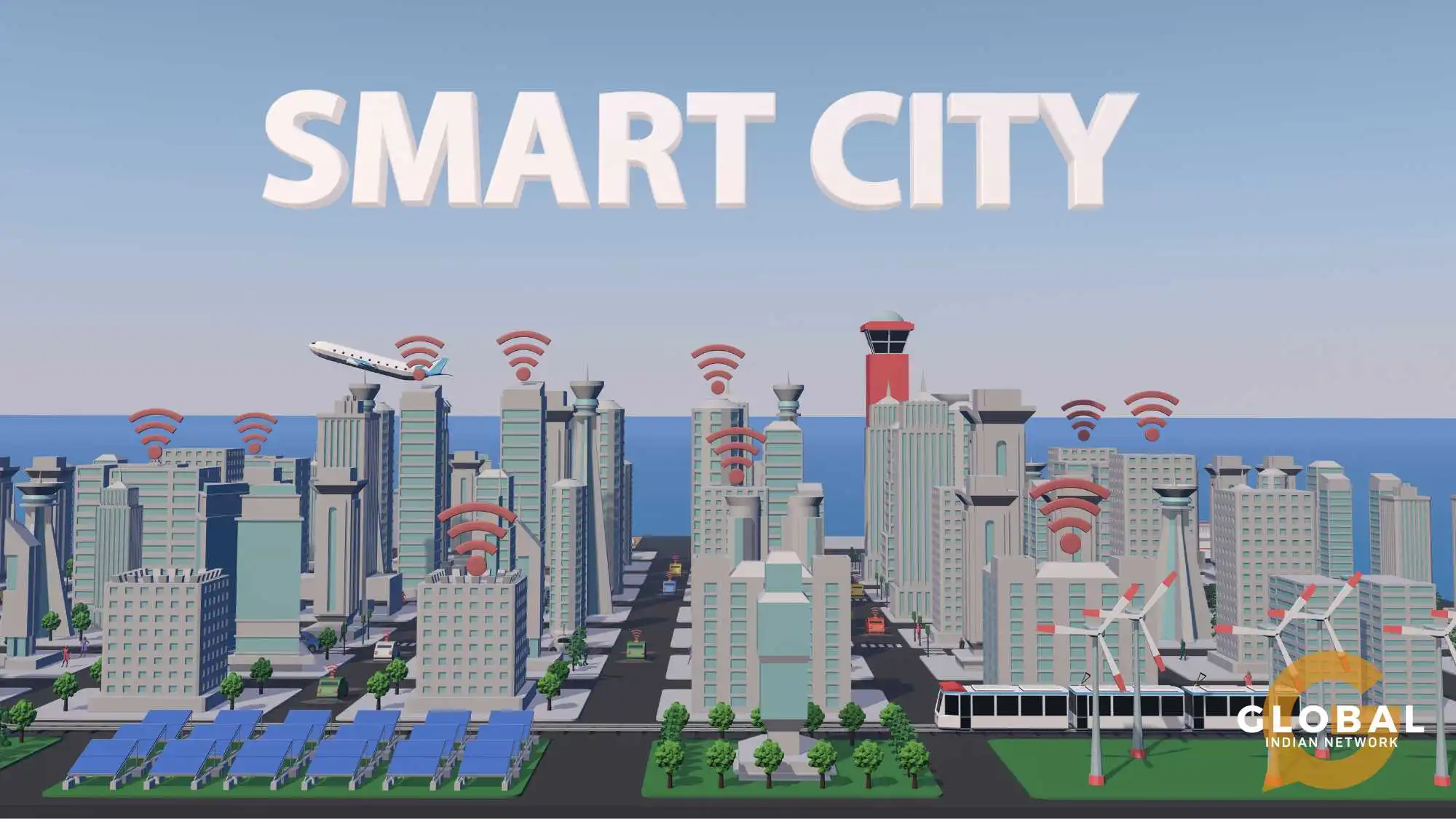India's bustling cities are transforming. The concept of smart cities in India is revolutionising urban living by merging technology with infrastructure development. This article explores the exciting intersection of real estate and smart cities in India. We'll examine how these smart city initiatives are shaping the future of Indian real estate, creating a more sustainable, efficient, and desirable urban landscape.
Table of Contents
Real State Market in India
The Indian real estate sector comprises residential, commercial, industrial, raw land, and special-use properties. Real estate investing in India is considered less volatile than stocks and mutual funds, making it a safe investment option. India's real estate sector has shown resilience and growth potential, driven by market forces and government policies. By 2030, it is projected to become a trillion-dollar market, focusing on investment and innovation. The Indian real estate market, currently valued at USD 0.33 trillion, is projected to reach USD 1.04 trillion by 2029, with a 25.60% compound annual growth rate. Despite the impact of the COVID-19 pandemic, the market continues to exhibit resilience and adaptability.
Image source: Real Estate Market in India - Industry Growth & Analysis (mordorintelligence.com)
Property Types
Residential properties, including houses, apartments, condominiums, and townhouses, offer a sense of belonging, personalisation, and long-term investment, promoting pride and stability in the living area.
Commercial properties, including offices, retail stores, and warehouses, are crucial for business purposes, with investment potential yielding rental income and appreciation influenced by location, market trends, and tenant relationships.
Industrial real estate is utilised for manufacturing and production activities, catering to businesses involved in production, logistics, and distribution.
Agricultural land is crucial for farming and crop cultivation in India's rural economy. India's agriculture sector employs over 50% of the workforce, contributing 20.2% to the country's GDP, and employs around 24.6% of the total workforce, or 118.9 million people.
ALSO READ: Smart Cities and Real Estate in Slovenia
Investment Potential
Capital Appreciation
India's real estate has consistently shown long-term capital appreciation, with cities' growth boosting demand for housing and commercial spaces, resulting in higher property values, suggesting substantial returns from investing in well-located properties.
Image source: Rental income
Rental Income
Owning residential or commercial properties can generate rental income, providing a stable monthly income and higher returns. Investing in high-demand areas offers better income prospects.
Tax Benefits
The Indian government provides tax benefits to real estate investors, including deductions on home loan interest, principal repayment, and property taxes, advising investors to consult a financial advisor.
Image source: Interest rate trends
Diversification
Real estate offers diversification in investment portfolios, as it's a tangible asset class that doesn't directly correlate with stock market movements, thereby mitigating risks.
Infrastructure Development
India's infrastructure development, including metro rail networks, highways, and airports, positively impacts property values, encouraging strategic investments in areas near upcoming projects.
Emerging Markets
Tier-II and Tier-III cities are attracting investors due to lower property prices, improved infrastructure, and growing employment opportunities.
Image source: House price indices
REITs (Real Estate Investment Trusts)
REITs offer real estate investment without property ownership, providing liquidity, diversification, and regular dividends. Keep an eye on Indian stock exchange-listed REITs.
Real estate investments necessitate thorough research, due diligence, and a long-term perspective. Consult experts, assess risk tolerance, and align investment strategy with financial goals.
India Real Estates Companies
India's real estate sector is home to several prominent companies. Here are some of the top real estate developers in India:
DLF Ltd: DLF Ltd, founded in 1946, is a Gurgaon-based company with 24 locations across India, known for projects like DLF Cyber City, DLF Emporio, and DLF Mall of India.
Godrej Properties Ltd: Godrej Properties, a Mumbai-based company, is part of the Godrej Group and has projects like Godrej Garden City and Godrej E-City, with an international presence.
Brigade Enterprises Ltd: Brigade Enterprises, founded in 1986 by M.R. Jaishankar, is headquartered in Bangalore and has notable projects like Brigade Gateway and Brigade Metropolis.
Sobha Ltd: Sobha Ltd, a Bangalore-based construction company, specializes in innovative designs and quality construction projects such as Sobha City and Sobha Silicon Oasis.
Prestige Estates Projects Ltd: Prestige Estates Projects, headquartered in Bangalore since 1986, is known for its projects such as Prestige Shantiniketan and Prestige Falcon City.
The companies mentioned have significantly impacted India's real estate sector, but it's important to note that there are numerous other reputable developers in the country.
Investing in Indian Real Estate
Investing in Indian real estate can be a rewarding venture, but it's essential to approach it strategically. Here are some key considerations and steps to guide your investment journey:
Market Research: Gain insight into India's real estate market trends, analyzing factors like demand-supply dynamics, property prices, and growth potential, and select cities or regions that align with your investment objectives.
Image source: Urban housing shortage in India
Budget and Financing: Determine your real estate investment budget, considering property costs and associated expenses, and explore financing options like home loans if necessary.
Property Type: Choose between residential, commercial, and industrial property types, each with its risk-reward profile, based on factors such as size, location, and potential for growth.
Location Matters: Location significantly influences property value and rental income. Consider areas with good infrastructure, proximity to amenities, future development potential, connectivity, schools, hospitals, and job hubs.
Legal Due Diligence: The text advises verifying property ownership, title deeds, and legal clearances, and consulting a lawyer to ensure all legal aspects are in order.
Rental Income vs. Capital Appreciation: Choose between rental income or capital appreciation when investing in residential properties, as rental income is typically generated, while commercial properties may appreciate faster.
Long-Term Perspective: Real estate is a long-term investment, so be patient and avoid speculative behaviour, as property values tend to appreciate over time, particularly in growing cities.
Developer Reputation: Research a developer's track record, project quality, and delivery timelines before purchasing, as established developers often offer superior post-sale services.
Tax Implications: Real estate investments are subject to income tax, where rental income and capital gains are taxable, and property tax, where annual property tax is paid to the local municipality.
Exit Strategy: Develop a clear exit plan for real estate, considering its lower liquidity compared to stocks, and decide whether to hold the property long-term or sell it after a specific period.
Real estate investment involves risks like market fluctuations, liquidity issues, and regulatory changes. Consult financial advisors and real estate experts for informed decisions.
Popular Areas for Property Investment in India
India's real estate market offers a plethora of investment opportunities across various cities. Let's explore some of the prime locations for property investment in India:
Image source: New office supply in India FY 2020 to FY 2022
Mumbai
Often referred to as the "City of Dreams," Mumbai stands as the financial capital of India.
Prime Locations
Bandra: Known for high-end residential properties, luxurious apartments, and stunning sea views.
Powai: Situated in the eastern part of the city, Powai offers serene surroundings, excellent connectivity, and upscale housing complexes.
South Mumbai: Encompassing iconic neighbourhoods like Colaba, Marine Drive, and Malabar Hill, South Mumbai boasts historic architecture and premium real estate values¹.
Image source: Unsold housing inventory of India
Pune
Pune has witnessed exponential growth in recent years.
Hotspots
Kalyani Nagar: A great choice for real estate investment.
Koregaon Park: Known for its upscale properties and vibrant lifestyle.
Deccan: Offers a mix of affordability and convenience.
Kolkata
Kolkata is the most affordable real estate destination in India. Recent trends include increased sales volume and the launch of projects due to the growth in infrastructural facilities across the city.
Delhi-NCR (National Capital Region)
Delhi-NCR includes areas in and around New Delhi.
Prominent Areas
Gurgaon (Gurugram): Known for its corporate offices, Gurgaon offers a mix of residential and commercial properties.
Noida: A hub for IT companies and modern residential complexes.
Greater Noida: Known for its planned infrastructure and affordable housing options.
Image source: Common Master Plan
Bangalore (Bengaluru)
Bangalore is a tech hub with a robust job market.
Key Areas
Whitefield: Popular for IT professionals and families.
Electronic City: Known for affordable housing and proximity to tech parks.
Koramangala: Offers a blend of residential and commercial spaces.
Hyderabad
Hyderabad's real estate market has been growing steadily.
Notable Zones
Gachibowli: Home to IT companies and upscale residential projects.
Hitec City: Another tech-centric area with good investment potential.
Banjara Hills: Known for luxury properties and a posh lifestyle.
Before investing in a city, it's crucial to conduct thorough research on factors such as location, infrastructure, rental yields, and long-term growth prospects.
Factors Driving Urbanisation
Urbanisation in India is a multifaceted phenomenon influenced by various factors. Let's explore the key drivers behind urbanisation:
Economic Catalysts
Industrialisation in urban areas generates job opportunities, attracting rural residents and boosting urbanisation. Rapid growth in the services sector, especially in IT and ITeS, drives urban migration.
Employment Opportunities
Urban areas provide better employment opportunities, attract people seeking livelihoods and career advancement, and are driven by diverse job options, higher salaries, and professional growth.
Educational Institutions
Cities are home to prestigious educational institutions, universities, and research centres, attracting students and professionals for quality education and skill development.
Urban Lifestyle and Amenities
Modern amenities like healthcare, entertainment, shopping malls, and recreational spaces attract people to cities, motivating migration for improved lifestyles.
Infrastructure Development
Urban centres are characterised by superior infrastructure, such as roads, public transportation, electricity, and sanitation, which enhance living conditions and convenience, driving people to live there.
Image source: Globalization and connectivity
Globalisation and Connectivity
Globalisation has connected cities globally, transforming them into hubs for trade, commerce, and cultural exchange, thereby attracting migration due to its attractiveness.
Natural Population Increase and In-Migration
Urban population growth is primarily driven by natural factors and in-migration from rural areas, with urban centres serving as magnets for individuals seeking better opportunities and a vibrant lifestyle.
India's urbanisation is influenced by economic factors, employment opportunities, education, infrastructure, and lifestyle aspirations, necessitating sustainable development to address challenges and ensure future prosperity.
Legal Requirements for Buying Property in India by Foreigners
When it comes to foreigners buying property in India, there are specific legal requirements and guidelines to consider. Let's explore the key points:
Eligibility
Citizens of certain countries, including Pakistan, Bangladesh, Sri Lanka, Afghanistan, China, Iran, Nepal, Bhutan, Macau, Hong Kong, and DPRK, require special permission from the Reserve Bank of India (RBI) to buy or sell property in India, except for leasing for up to five years. Overseas Citizens of India (OCI) holders are exempt from this rule and can buy property in India without special permission.
Residential Property Purchase
Foreign nationals of non-Indian origin residing in India can buy immovable property, except for the 11 previously mentioned countries, and legal US citizens are allowed to do so. Foreign nationals of non-Indian origin living outside India can lease property for up to five years and inherit land from an Indian resident but cannot acquire immovable property in India.
Persons of Indian Origin (PIO)
Foreign Indian citizens (PIOs) have additional privileges, including the ability to purchase immovable property in India without special permission and inherit property from Indian residents, except for agricultural land, farmhouses, or plantation properties.
Required Documents
When investing in property in India, foreigners should have the following documents:
- Valid passport.
- Overseas Citizen of India (OCI) card (if applicable).
- PAN card (for financial transactions).
- Proof of current address.
- Power of attorney (if needed).
- Additionally, consider other costs such as stamp duty, registration fees, legal fees, and realtor commissions.
Due Diligence
To acquire property in India, research its legal status, avoid restricted regions, and follow RBI guidelines, including obtaining a no-objection certificate if needed. Understanding specific rules based on your status (NRI, PIO, or foreign national) ensures a smooth process.
Sustainability Integrated into Real Estate Development
India's real estate sector is transforming by integrating sustainability measures like energy efficiency, water conservation, eco-friendly materials, smart city solutions, and social considerations to create environmentally responsible and inclusive spaces.
Let's explore this further:
Energy Efficiency
Developers are incorporating energy-efficient practices in building design and construction, including lighting, HVAC systems, insulation materials, and renewable energy integration like solar panels.
Water Conservation
Indian cities face water scarcity, prompting real estate projects to incorporate rainwater harvesting systems, efficient plumbing fixtures, and wastewater treatment plants to reduce consumption and promote sustainable water management.
Image source: Water conservation
Eco-Friendly Materials
Developers are increasingly embracing sustainable and locally sourced materials, including recycled materials, low-VOC paints, and eco-friendly flooring options, with green certifications like Leadership in Energy and Environmental Design (LEED) and Green Rating for Integrated Habitat Assessment (GRIHA) promoting eco-friendly practices.
Fundamentals of Sustainable Real Estate Projects
Smart City Solutions: Smart cities are gaining momentum as real estate projects integrate smart technologies for energy monitoring, waste management, and efficient transportation, enhancing occupant comfort and reducing resource wastage.
Social Considerations: Sustainable real estate is promoting socially inclusive spaces with amenities like parks, community centres, and recreational areas, emphasising accessibility features for differently-abled individuals.
Green and Sustainable Homes: Developers are integrating sustainable infrastructure like electric vehicle charging stations, bicycle lanes, and community gardens to encourage eco-friendly practices, community engagement, and shared environmental responsibility among residents.
The Indian real estate sector is promoting sustainability, with investors, customers, and developers focusing on environmentally responsible practices, indicating continued growth in sustainable real estate development across the country.
ALSO READ: Smart Cities and Real Estate in Slovenia
Overview of a Smart City
A smart city utilises technology and data collection to enhance residents' quality of life and city efficiency, fostering a sustainable, connected, and responsive urban environment.
Image source: Smart City Mission of India
Cities are economic hubs, offering diverse job opportunities and attracting people seeking better employment, higher wages, and career growth. They foster innovation, entrepreneurship, and collaboration, and their proximity to businesses, financial institutions, and markets encourages economic activity.
Image source: Smart City principles
Cities with prestigious educational institutions, universities, and research centres attract migration due to quality education. Lifelong learning opportunities, libraries, and intellectual exchanges thrive in cities. They offer economic and cultural benefits, but safety concerns like urban violence, crime rates, and personal security persist. Addressing these issues requires effective policing, community engagement, and infrastructure improvements.
Urban planners and designers must strike a balance between housing supply, rental prices, and homeownership options to attract residents to cities with reasonable housing costs. Cities that invest in sustainable mobility options, such as efficient public transportation systems and walkability, are more likely to attract and retain residents.
In summary, smart cities strive to create a harmonious blend of technology, citizen well-being, and efficient urban management.
Principles of Smart Cities
Key Features of Smart Cities
Smart cities foster vibrant public spaces for community interaction, recreation, and cultural activities. The concept of placemaking is central to enhancing public spaces' functionality and appeal. Advanced technologies are used for disaster management, ensuring preparedness, response, and recovery in these cities.
Image source: Components of a smart city
Planning
Smart cities promote inclusive urban planning, involving citizens in the process to ensure diverse needs, accessibility, and social equity in public spaces, housing, and amenities. Smart cities prioritise enhancing residents' well-being through green spaces, cultural amenities, recreational facilities, health monitoring, mental health support, and community engagement programs, thereby enhancing the overall quality of life.
Transportation
Smart cities prioritise sustainable transportation, including public transit, bike lanes, pedestrian-friendly streets, and electric vehicle charging stations, with Mobility-as-a-Service platforms integrating various modes for seamless travel. Smart surveillance systems, emergency response networks, and predictive policing improve safety, while cybersecurity measures safeguard critical infrastructure and personal data.
Technology
Smart cities utilise data from sensors, social media, and public services to inform decision-making processes, enabling effective problem-solving. Examples include optimising traffic flow, predicting energy demand, and enhancing emergency response. Smart cities require high-speed internet access, robust digital infrastructure for communication, e-governance, smart services, and the Internet of Things (IoT) for real-time monitoring and control of urban systems like streetlights and waste management.
Sustainability
Smart cities prioritise environmental sustainability by reducing energy consumption, promoting renewable energy, and efficient waste management. They also focus on resilience, preparing for natural disasters and climate change, and ensuring their infrastructure can withstand and adapt to such challenges.
Collaboration
Smart cities foster innovation and efficient resource utilisation through public-private partnerships, academia, and community organisations, while open data initiatives promote transparency and accountability.
Smart City Initiatives in India
Image source: Smart City Mission of India - Timeline
India is actively pursuing the Smart Cities Mission to transform urban areas into efficient, sustainable, and technologically advanced hubs. Here are some key aspects of this initiative:
Smart Cities Mission
The Smart Cities Mission, launched in 2015, aims to develop 100 smart cities by 2024 by utilising technology and innovative urban planning to tackle population growth and urbanisation challenges. The mission aims to foster sustainable and inclusive development by creating replicable models for other cities, focusing on compact areas to improve infrastructure, enhance quality of life, and promote economic growth.
Project Categories
The Smart Cities Mission encompasses various project categories. Some of these include:
Smart Roads: 310 projects related to road infrastructure improvements.
Smart Solar: 57 projects focused on solar energy utilization.
Smart Water: 101 projects related to water management and supply.
Public-Private Partnerships (PPP): 123 projects involving collaboration between the government and private entities.
Vibrant Public Places: 72 projects aimed at creating attractive and functional public spaces.
Strategic Components
The mission focuses on three strategic components for area-based development:
City Improvement (Retrofitting): Upgrading existing infrastructure and services.
City Renewal (Redevelopment): Transforming specific areas through redevelopment.
City Extension (Greenfield Development): Creating new urban spaces.
Additionally, there's a Pan-city initiative where smart solutions are applied across larger parts of the city.
First 22 Smart Cities
The 22 smart cities include Bhopal, Indore, Agra, Varanasi, Chennai, Coimbatore, Erode, Ranchi, Salem, Surat, Udaipur, Visakhapatnam, Ahmedabad, Kakinada, Pune, Vellore, Pimpri-Chinchwad, Madurai, Amaravati, Tiruchirappalli, and Thanjavur.
Key Initiatives
India Urban Data Exchange (IUDE): A platform for sharing urban data to enhance decision-making and planning.
Artificial Intelligence Strategy for Urban India (AISUI): Integrating AI to improve urban services and governance.
Smart City Standards (SCSs): Developing standards for smart city infrastructure and technologies.
Impact and Vision
The Smart Cities Mission aims to improve citizens' quality of life by enabling local development and harnessing technology.
It focuses on creating smart outcomes through sustainable practices, connectivity, and citizen engagement.
India's commitment to smart cities reflects its vision for a more efficient, inclusive, and resilient urban future.
Smart Cities in India
The Smart Cities Mission is an urban renewal and retrofitting program launched by the Government of India in 2015 with the goal of developing 100 smart cities across the country. Some key points about the Smart Cities Mission in India:
The smart cities competition, which involved states nominating potential cities and evaluating them, has resulted in 100 cities being selected through four rounds as of 2023.
India's top smart cities, including Ahmedabad, Surat, Pune, Jaipur, Bhubaneswar, Visakhapatnam, and Coimbatore, have implemented innovative solutions in green urban living, transportation, governance, and community development.
Image source: Smart City Mission of India - Population
The mission is executed by Special Purpose Vehicles (SPVs) at the city level, with equal participation from the state/UT and urban local bodies responsible for transforming smart city proposals into actual projects.
As of September 2023, the Smart Cities Mission has commissioned 7,960 projects worth ₹171,432 crore (US$21 billion), with 6,188 projects completed thus far.
The Smart Cities Mission is a government initiative aimed at transforming India's urban centres into sustainable, livable, and technology-driven cities, thereby enhancing the quality of life for its citizens.
Challenges Faced by Smart Cities in India
The development of smart cities in India comes with its share of challenges. Let's explore some of the key obstacles:
Financing: Financing for smart city projects remains a significant challenge, as they require substantial investments in infrastructure, technology, and sustainable solutions, necessitating a balance between costs and benefits.
Lack of Center-State Coordination: Successful smart city implementation necessitates coordination between national, state, and local government bodies, and lack of alignment can hinder progress and delay initiatives.
Image source: Smart city concept
Availability of Master Plans: Indian cities often lack comprehensive master plans and development strategies, making it challenging to integrate smart solutions and ensure effective urban transformation without clear planning.
Complex Urban Challenges: Indian cities face unique challenges like resource scarcity, air pollution, waste management issues, traffic congestion, and ageing infrastructure, necessitating smart solutions for sustainability and inclusivity.
Legacy Infrastructure: Retrofitting existing infrastructure to meet smart city standards can be costly and time-consuming, but upgrading utilities, transportation systems, and public spaces without disrupting daily life is a formidable task.
Citizen Participation and Awareness: Citizenship in smart city processes is crucial, with awareness campaigns and participatory planning fostering support and ensuring residents understand the benefits and actively participate in the transformation.
Data Privacy and Security: Smart cities require robust cybersecurity measures to protect citizens' privacy and secure sensitive information, ensuring data privacy and security in the collection and analysis process.
Image source: Technology in smart cities
Technological Integration: Smart cities require robust cybersecurity measures to protect citizens' privacy and secure sensitive information, ensuring data privacy and security in the collection and analysis process.
Sustainability and Resilience: Smart cities must balance economic growth with environmental sustainability by building resilient infrastructure that can withstand natural disasters and climate change.
Public-Private Partnerships (PPPs): Public-Private Partnerships (PPPs) involve collaboration between public and private entities for funding, expertise, and implementation, requiring transparent contracts, risk-sharing, and goal alignment for successful execution.
Addressing these challenges will pave the way for successful smart cities in India, benefiting millions of urban residents.
Addressing Transportation Challenges
India's Smart Cities Mission is an ambitious initiative aimed at transforming urban areas into technologically advanced and sustainable hubs. Let me provide you with some information about smart cities in India:
Image source: Recreation in smart city
Current Progress
Image source: Smart city progress
The National Smart Cities Mission is an India-based initiative aimed at developing smart cities, aiming to make them citizen-friendly and sustainable. The Union Ministry of Urban Development, in collaboration with state governments, is responsible for implementing the program, which aims to include 100 cities by 2023.
The smart cities currently have 8,037 projects underway, with 88% of them ongoing at ₹1,41,326 crore and 12% completed at ₹26,710 crore, with a total investment of ₹1,68,036 crore (as of May 2024). The mission currently consists of 100 smart cities. 88% of these projects are ongoing, while 12% have been completed.
The portal of the Ministry of Urban Development offers insights into project specifics, financing, and implementation strategies.
Examples of Smart Cities in India
The first 22 smart cities include Bhopal, Indore, Agra, Varanasi, Chennai, and Pune. Let's explore the completion status of some of the smart city projects in each of the mentioned cities:
Bhopal: Bhopal has made significant strides, completing 92% of its smart city projects, demonstrating its proactive approach to improving urban living.
The Bhopal Smart City Development Corporation Limited (BSCDCL) was established as a special purpose vehicle (SPV) to plan, design, implement, coordinate, and monitor smart city projects in Bhopal. The city's SPV has identified over 64 projects, with over 22 completed and 18-19 currently underway for the entire city.
BSCDCL has divided smart city projects into three phases: Phase 1, Energy Conservation, Phase 2, Water Conservation, and Phase 3, Housekeeping & Water Management, from 2020-2033.
Indore: Indore, a smart city in Madhya Pradesh, has completed around 70% of its projects, with ongoing efforts to enhance infrastructure and services.
Indore Smart City has 90 proposed projects under the smart cities mission, costing Rs 3,041.55 crore. 13 completed at Rs 35.17 crore, and 54 at Rs 931.37 crore are currently in the implementation stage.
Agra: The Agra Metro Phase 1, starting in December 2020, will cover 29.65 kilometres and will include the 5.2 km Priority Corridor, which has been operational since March 2041, with the entire project expected to be completed by the end of 2026.
Varanasi: Varanasi, a spiritual and cultural hub, has made significant progress with 98 out of 104 smart city projects successfully executed, focusing on infrastructure and livability enhancement.
Chennai: Chennai Smart City Limited has completed 37 projects, totalling Rs 599 crore, with 44 remaining in the work order stage, aiming to improve street lighting, implement smart meters, restore water bodies, and create pedestrian plazas.
Cities are working towards smart city goals, enhancing urban development and residents' quality of life through unique initiatives at varying completion levels.
Successful Aspects of Smart City Implementation
India's Smart Cities Mission has led to several innovative projects across the country. Let's explore some case studies that highlight successful smart city implementations in India:
Vertical Gardens in Jammu
Jammu, a smart city, has implemented vertical gardens to enhance beautification and environmental sustainability. These gardens, created on building sides using trellises and planters, improve air quality, reduce urban heat island effects, and enhance aesthetics in densely populated areas.
Image source: Vertical garden in Jammu
Smart Streetlights in Nashik
Nashik, a smart city, has upgraded its street lighting system to energy-efficient LED lights, which automatically adjust brightness based on ambient light and can be remotely monitored, resulting in significant energy savings and improved safety for pedestrians and motorists.
Image source: Smart Streetlights in Nashik
Bio-CNG for Public Transport in Indore
Indore, renowned for its waste management initiatives, has introduced bio-CNG (compressed natural gas) for its public buses, a cleaner alternative to conventional fossil fuels. This move has reduced greenhouse gas emissions, promoted a circular economy, and enhanced air quality in the city.
Bus Rapid Transit (BRT) System in Pune, Ahmedabad, and Chennai
Pune, Ahmedabad, and Chennai have implemented BRT systems as an alternative to metro rail, offering efficient bus services, signal prioritisation, and well-designed stations, thereby enhancing public transportation, reducing traffic congestion, and providing sustainable commuting.
Urban Management in Smart Cities
The Smart Cities Mission emphasises efficient urban management, with successful case studies showcasing successful practices in waste management, water supply, e-governance, and citizen engagement.
These case studies demonstrate how smart cities in India are leveraging technology, sustainability, and citizen participation to create more livable and efficient urban spaces.
Fully Operational Smart City in India
One notable example of a fully operational smart city in India is GIFT City. Let's explore more about it:
GIFT City (Gujarat International Finance Tec-City): GIFT City, located in Gujarat, India, is India's first fully operational smart city and an International Financial Services Centre, aiming to create an efficient platform for inbound and outbound foreign currency operations.
Infrastructure and Features: GIFT City, a vertical city covering 886 acres, offers 62 million square feet of built-up area, 67% commercial, 22% residential, and 11% social space, featuring a Multi-Service SEZ and an exclusive Domestic Tariff Area.
Image source: GIFT City
Infrastructure highlights: GIFT City, strategically located on the Sabarmati River, offers efficient cooling, automated waste collection, and concealed utility services. Its strategic location, excellent internal transportation connections, and proximity to Ahmedabad International Airport enhance connectivity.
Awards and Recognition: GIFT City's futuristic infrastructure development has won multiple awards, including the GREEN CITIES' PLATINUM Certification from the Indian Green Building Council (IGBC) for its green master planning and design.
GIFT City showcases how smart technology, efficient infrastructure, and strategic planning can significantly boost economic growth and improve the quality of life for its citizens.
ALSO READ: Smart Cities and Real Estate in Slovenia
Conclusion
India's real estate sector is undergoing a transformation due to the integration of smart city concepts, highlighting the increasing synergy between urbanization and real estate development. India's smart city development strategy focuses on improving urban infrastructure, enhancing public services, promoting sustainable practices, and increasing citizen engagement and governance through area-based development and greenfield development.
Out of 100 selected cities, only 34 have met targets under the Smart City Mission (SCM), while 66 are still completing their projects. The deadline was originally set for 2020 but was extended to 2023 and 2024 due to Covid-19 disruptions. The time frame for completing the projects needs to be adapted for the welfare of the end users.











[…] burgeoning real estate sector and the increasing focus on smart city development in India present a unique opportunity for collaboration between India and Slovenia. This article explores […]
[…] serves as a role model for cities in India in the pathway of smart city waste […]